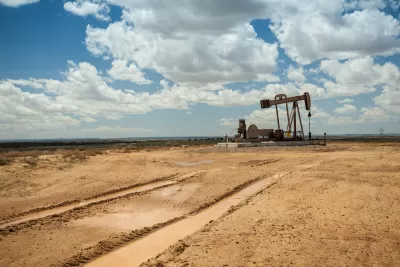New Mexico's HB 361 proposes repurposing depleted oil and gas wells for energy storage and geothermal development, offering a potential solution to both electricity shortages and environmental challenges.

New Mexico is exploring the potential to repurpose its vast number of depleted oil and gas wells for energy storage and geothermal development through HB 361, a bill that recently advanced in the House Energy, Environment and Natural Resources Committee. Sponsored by Rep. Andrea Romero, the bill seeks to encourage innovation while addressing environmental concerns associated with inactive and orphaned wells. One of the primary technologies being considered is mechanical energy storage, a process pioneered by Renewell Energy, which uses a weighted system in water-filled wells to generate electricity during peak demand. As reported by Hannah Grover, while the bill does not establish who will be responsible for decommissioning repurposed wells, it lays the groundwork for rulemaking to determine these responsibilities if the legislation passes.
Supporters of the bill, including representatives from Xcel Energy and energy policy experts, see it as an opportunity to address both electricity shortages and the longstanding problem of abandoned wells. While some regions of New Mexico do not have a direct overlap between geothermal potential and oil and gas activity, the legislation would allow for multiple pathways to repurpose wells for clean energy production. Proponents argue that repurposing wells into energy assets could provide economic benefits while reducing environmental hazards, making it a forward-thinking approach to infrastructure reuse.
Despite bipartisan interest in the concept, some lawmakers, including Rep. Rod Montoya and Rep. Mark Murphy, opposed the bill in its current form, citing concerns over financial assurances and a lack of discussion during interim legislative meetings. However, both expressed a willingness to revisit the idea with further refinements. As New Mexico looks for ways to expand its energy capacity while managing its legacy of inactive wells, HB 361 presents a potentially groundbreaking approach that merges environmental remediation with renewable energy innovation.
FULL STORY: Could depleted oil and gas wells help the electric grid?

Maui's Vacation Rental Debate Turns Ugly
Verbal attacks, misinformation campaigns and fistfights plague a high-stakes debate to convert thousands of vacation rentals into long-term housing.

Planetizen Federal Action Tracker
A weekly monitor of how Trump’s orders and actions are impacting planners and planning in America.

In Urban Planning, AI Prompting Could be the New Design Thinking
Creativity has long been key to great urban design. What if we see AI as our new creative partner?

King County Supportive Housing Program Offers Hope for Unhoused Residents
The county is taking a ‘Housing First’ approach that prioritizes getting people into housing, then offering wraparound supportive services.

Researchers Use AI to Get Clearer Picture of US Housing
Analysts are using artificial intelligence to supercharge their research by allowing them to comb through data faster. Though these AI tools can be error prone, they save time and housing researchers are optimistic about the future.

Making Shared Micromobility More Inclusive
Cities and shared mobility system operators can do more to include people with disabilities in planning and operations, per a new report.
Urban Design for Planners 1: Software Tools
This six-course series explores essential urban design concepts using open source software and equips planners with the tools they need to participate fully in the urban design process.
Planning for Universal Design
Learn the tools for implementing Universal Design in planning regulations.
planning NEXT
Appalachian Highlands Housing Partners
Mpact (founded as Rail~Volution)
City of Camden Redevelopment Agency
City of Astoria
City of Portland
City of Laramie





























